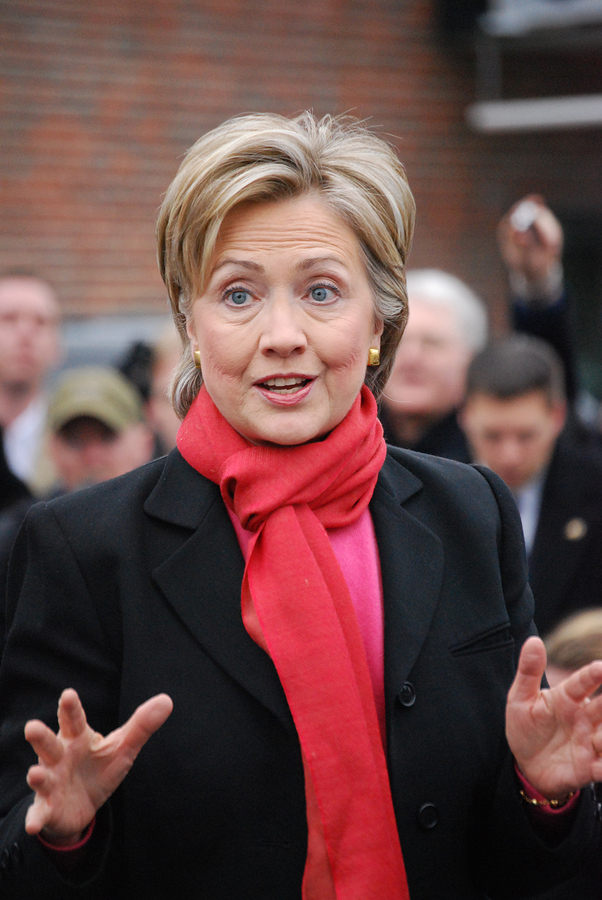One Poll That Isn’t Going Clinton’s Way Is the U.S. Stock Market

(Bloomberg) —Few institutions have a better track record calling presidential races than the U.S. stock market. At the moment, it’s sending information that counts against Democrat Hillary Clinton.
The performance of the S&P 500 Index has signaled the outcome of every presidential election since 1984, according to an analysis by Strategas Research Partners LLC. A gain in the benchmark for American equity in the three months prior to the vote has seen the incumbent party win 86 percent of the time since 1928. Right now, the benchmark gauge is down 2.9 percent since Aug. 8 with just a week until the vote, a fact that in isolation augurs well for Donald Trump.
Logically, the stock market’s record of prescience is derived from its sensitivity to the economy, with falling shares potentially correlating with consumer discontent that might break in favor of a challenger. While this year’s signal ranks with the weaker ones historically, it comes as growth in gross domestic product is sluggish and follows the biggest monthly retreat in consumer confidence in a year. Some analysts also wonder if Federal Reserve stimulus has made stocks a less reliable signal of economic health than they were in the past.
“People may be saying ‘I think Clinton is going to win,’ but people are not putting their money to work on the fear of a Brexit like event,” said Daniel Clifton, head of policy research at Strategas Research Partners. “The range of outcomes has been increasing in recent weeks rather than decreasing.”
The reputation of markets in handicapping politics took a beating in June, when stocks around the world soared prior to the U.K. referendum only to fall the most in five years when voters chose to secede. Just four months removed from that shock, anxiety levels have spiked in the final week of an election season marked by twists. Clinton’s once-dominant lead over Republican Donald Trump has withered in polls since news Friday that her e-mails remain a topic of interest to the FBI.
Those hoping to use equities as a thermometer should be aware that the stock market has rarely been as divorced from the economy as in the last seven years. Helped along by near-zero interest rates, the S&P 500 has returned 3.7 percent a quarter on average since March 2009, compared with a 0.9 percent gain in gross domestic product. That gap is the widest since World War II.
Fed rate intentions are playing a role, with odds that the central bank tightens this year surging past 70 percent. That’s helped boost financial shares 1.2 percent since Aug. 8. Banks and tech shares are the only of 11 groups in the S&P 500 that have gained. Phone, real-estate and utility shares have plunged in that period, as rising odds for higher interest rates damped enthusiasm for stocks coveted for their high dividend payouts.
The banking sector is also the industry most closely tied to the election and favors Trump, according to analysis by Bloomberg. The S&P 500 Investment Banking and Brokerage index has rallied 14 percent in the last three months.
“Despite the fact that Clinton has been ahead in the polls and is likely to win, most of the traditional industries that you would expect would do better under a Republican presidency have done better,” said Michael Arone, the Boston-based chief investment strategist at State Street Global Advisors’ U.S. intermediary business.
Equities struggled for direction Monday amid earnings from Pfizer Inc. that disappointed, while factory data in China bolstered optimism on global growth. Archer-Daniels-Midland Co. rose the most in four years after the world’s largest corn processor posted better-than-expected earnings. Tronc Inc. plunged after Gannett Co. dropped its pursuit of the publisher of the Chicago Tribune and the Los Angeles Times.
The S&P 500 lost 0.3 percent to 2,119.90 at 11:33 a.m. in New York, after holding yesterday at a six-week low. The Dow Jones Industrial Average fell 37.76 points, or 0.2 percent, to 18,104.66.
“The election is giving people an excuse to sit on their hands,” said Matt Maley, an equity strategist at Miller Tabak & Co. LLC in New York. “People don’t want to make any big bets in front of something we know will be resolved on election day. There are just so many uncertainties. It’s not just the presidency but also the houses of Congress.”



No Comment